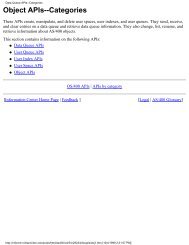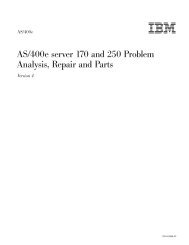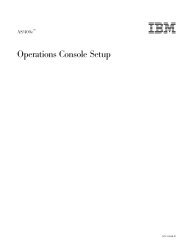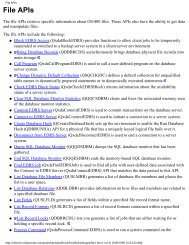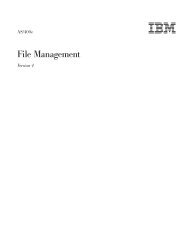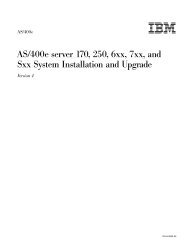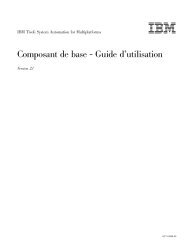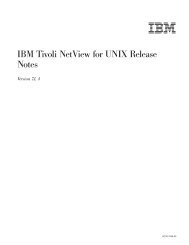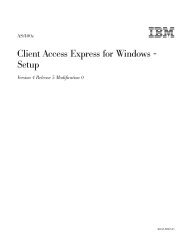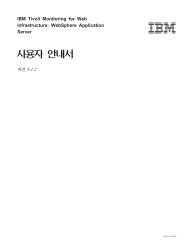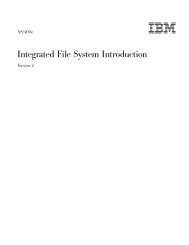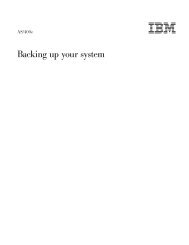Qshell Interpreter (qsh) - FTP Directory Listing - IBM
Qshell Interpreter (qsh) - FTP Directory Listing - IBM
Qshell Interpreter (qsh) - FTP Directory Listing - IBM
You also want an ePaper? Increase the reach of your titles
YUMPU automatically turns print PDFs into web optimized ePapers that Google loves.
Description<br />
Options<br />
60 <strong>Qshell</strong> <strong>Interpreter</strong> (<strong>qsh</strong>)<br />
For each operand that names a file of a type other than directory, ls displays its<br />
name as well as any requested, associated information. For each operand that<br />
names a file of type directory, ls displays the names of files contained within that<br />
directory, as well as any requested, associated information.<br />
If no operands are given, the contents of the current directory are displayed. If more<br />
than one operand is given, non-directory operands are displayed first; directory and<br />
non-directory operands are sorted separately and in lexicographical order.<br />
-A List all entries except for “.” and “..”.<br />
-C Force multi-column output; this is the default when output is to a terminal.<br />
-F Display a slash (/) immediately after each path name that is a directory, an<br />
asterisk (*) after each that is executable, and an at sign (@) after each<br />
symbolic link.<br />
-L If argument is a symbolic link, list the file or directory the link references<br />
rather than the link itself.<br />
-R Recursively list subdirectories.<br />
-T Display complete time information for the file, including month, day, hour,<br />
minute, second, and year when the -l option is also specified.<br />
-a Include directory entries whose names begin with a dot (.).<br />
-c Use time when file status was last changed for sorting or printing.<br />
-d Directories are listed as plain files (not searched recursively) and symbolic<br />
links in the argument list are not indirected through.<br />
-f Output is not sorted.<br />
-i For each file, print the file’s file serial number (inode number).<br />
-l (Lowercase letter ′ell.’) List in long format. See Extended Description below<br />
for details. If the output is to a terminal, a total sum for all the file sizes is<br />
output on a line before the long listing.<br />
-o Include the file flags in a long (-l) output.<br />
-q Force printing of non-graphic characters in file names as the question mark<br />
(?) character. This is the default when output is to a terminal.<br />
-r Reverse the order of the sort to get reverse lexicographical order or the<br />
oldest entries first.<br />
-s Display the number of file system blocks actually used by each file, in units<br />
of 512 bytes, where partial units are rounded up to the next integer value. If<br />
the output is to a terminal, a total sum for all the file sizes is output on a<br />
line before the listing.<br />
-t Sort by time modified (most recently modified first) before sorting the<br />
operands by lexicographical order.<br />
-u Use time of last access, instead of last modification of the file for sorting (-t)<br />
or printing (-l).<br />
-1 (The numeric digit one) Force output to be one entry per line. This is the<br />
default when output is not to a terminal.



